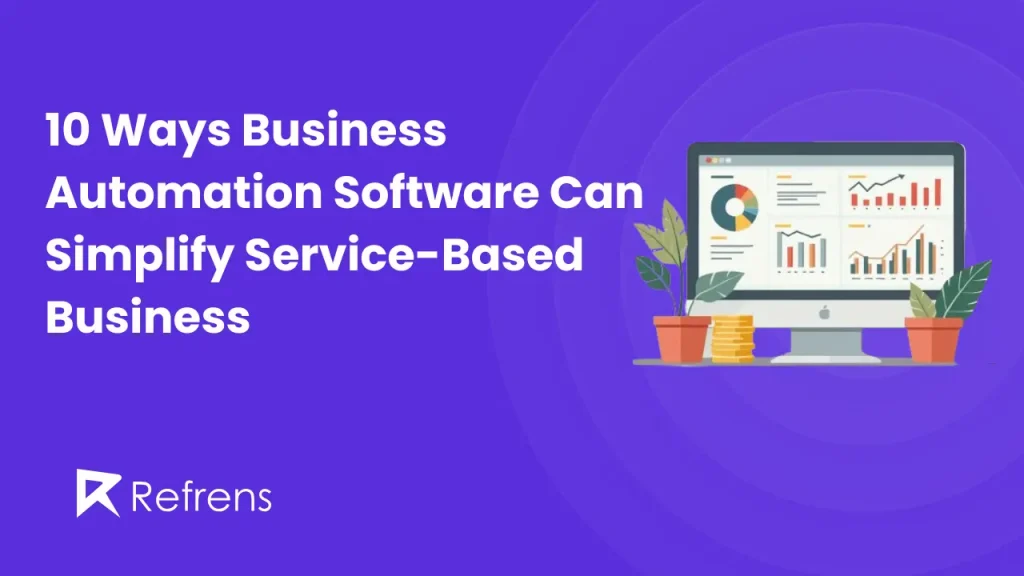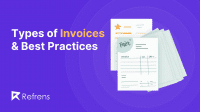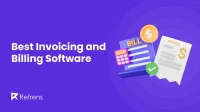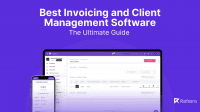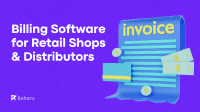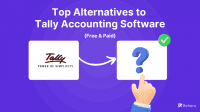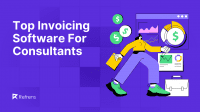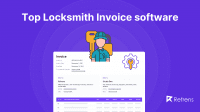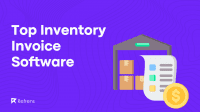Financially managing a service-based business can feel like an uphill struggle, from tracking payments, sending invoices, and keeping on top of taxes to keeping an eye on expenses manually. Automation can make all this more manageable; Free up time for what matters most: growing your business!
We will explore ten practical strategies that can automate and streamline your finances, as well as some future trends for automation so that you stay ahead of the game.
1. Automate Your Invoicing
Invoicing clients can be time consuming. Automation software like refrens enables you to set recurring invoices that automatically fill client information and even remind of payments overdue with gentle reminders – helping reduce back and forth while keeping cashflow steady.
Did You Know? About 40% of small business owners report that delayed payments negatively impact their financial health. Automated invoicing solutions have the ability to cut these delays by up to 50% – no small feat indeed.
2. Employ Expense Tracking Software
Manually entering expenses is both time consuming and can lead to mistakes, so use expense tracking software which connects directly with your business bank account in order to categorize and track them automatically, thus keeping every receipt or purchase documented immediately.
Field Promax provides an expense tracking feature that makes staying organized and on budget easy and effortless.
3. Integration of Systems
One of the greatest benefits of automation lies in how it unites different aspects of your business, from accounting and project management systems, CRM databases, Customer management platforms and CRM sales software – including any potential errors that could prevent accurate financial reporting – by connecting all three. By unifying all these parts together you will save both time and avoid errors which might throw off your books altogether.
Integrating invoicing software and CRMs together can ensure client follow-ups run more smoothly, so no details fall through the cracks.
4. Automate Bill Payments
Paying late can have serious repercussions that impact both your credit score and finances, incurring late fees as a result. Setting up automatic bill payments for software subscriptions, utility bills and loan repayments will give you peace of mind each month by being one less thing you have to worry about!
But not just your bill payments; you can even add discounts for your store, like cart discounts, bulk deals, BOGO offers, or even seasonal promotions.
5. Automate Payroll Processing
Payroll doesn’t need to be complex or time consuming: Payroll automation software makes the task straightforward with accurate wages calculations, tax deduction, direct deposits to employees’ bank accounts and ensure compliance with tax deadlines and regulatory requirements – giving you peace of mind!
Pro Tip: Consider choosing payroll software which also tracks employee hours and integrates seamlessly with your accounting system to enable smooth data flow.
6. Leverage Cash Flow Forecasting Tools
Cash flow forecasting tools provide invaluable assistance for accurately forecasting the short and long term health of your business’s finances. They do this by examining past data as well as anticipated income and expenses to create projections showing possible cash gaps or surpluses so you can plan ahead, make informed financial decisions, and prevent unwelcome surprises from coming your way.
Industry Insight: By 2025, an estimated 70% of small businesses will use AI-powered forecasting tools to make more strategic financial decisions – automation can help your small business take this important step early on.
7. Set Automatic Payment Reminders
Chasing payments down can put undue strain on client relationships and waste time and resources. Creating automatic reminders allows you to send polite nudges at regular intervals – no additional effort necessary – to improve cash flow while keeping clients on schedule without the awkward “Hey, did you get my invoice” emails from clients. This method increases cash flow while keeping cash on schedule without disrupting relationships in an awkward way.
8. Automate Financial Reporting
Monthly financial reports are essential to understanding your company’s health, but they don’t need to be generated manually. Many online accounting software options feature automated reporting features which pull data and compile it in easily digestible formats allowing you to see profit/loss trends, expenses costs and revenue projections quickly without spending hours at your computer screen.
Automated reporting enables you to spend less time fiddling around in spreadsheets and more time making informed strategic business decisions based on real-time information
9. Employ Tax Filing Software
Tax season can be stressful, but automation can make the experience less so. Tax filing software collects and organizes income and expenses throughout the year so when tax season rolls around you’re more prepared than ever – with automatic deductions that lower tax liability automatically!
Quick Stat: Eight out of 10 businesses that implement tax automation report an increased reduction in filing errors and compliance issues, leading to decreased compliance issues and errors.
10. Adopt a Field Service Management Platform
Field Promax’s field service management platform can be transformative for service-based businesses, offering tools for scheduling, invoicing and expense tracking – all from one convenient interface. Having one place where all your workflow converges makes monitoring financial health straightforward: imagine having access to real-time updates about revenue, expenses and outstanding payments!
Future Trends in Financial Automation for Service-Based Businesses
Automation technology is rapidly progressing for small businesses. Here are a few trends to keep an eye on:
- Artificial Intelligence Insights: Artificial intelligence is revolutionizing automation by offering customized financial insights based on your data. Experts project that by 2030 AI will be integrated into virtually all small business software from accounting to payroll solutions.
- Blockchain for Payment Security: Blockchain has many uses beyond cryptocurrency; companies are looking at it as a secure, transparent payment processing method which could reduce fees while speeding transactions and increasing data protection.
- No-Code Automation Solutions: As more no-code tools emerge, making it simpler than ever for non-tech-savvy business owners to set up automated workflows without needing a developer – an invaluable advantage for lean teams.
Beginning Automation in Your Service-Based Business
Business automation systems might feel intimidating at first, but starting small won’t put too much strain on your operations overnight. Begin with automating one small task such as invoicing or expense tracking before expanding from there. As soon as you experience time savings and reduced errors from automation processes, adding more will become much simpler.
Automating your business finances doesn’t just save time: It also gives you greater visibility into its health. Imagine no longer worrying about late bills, missed payments or complex spreadsheets! With the right tools and some careful planning you can simplify finances so that you can focus on running your business instead.
Financial automation can be an invaluable asset to service-based businesses. From invoicing and payroll processing, automation tools can reduce workload while improving accuracy – setting you up for smoother operations and future expansion.
Which task or processes will you automate first?
